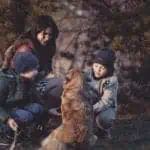

The lawyers and staff at Moe Hannah LLP are animal lovers. We love to share stories about our four legged friends and, on occasion, we have snuck some of the smallest and most adorable among them into our office for the afternoon.
It’s not uncommon for people to regard pets as part of the family, we certainly understand that at our firm. So, when a relationship breaks down, are our pets subject to the same considerations as our family members?
In Canada, the law usually states that they are not. Recent cases out of Saskatchewan have determined that pets are considered personal property. Instead of considering what is in the best interest of a pet, as would be considered in the case of a child, the courts consider who has the better case for legal ownership. In 2016, the case of Henderson v Henderson (2016 SKQB 282) made it clear: the Honourable Justice R.W. Danyliuk acknowledged the important role animals play in modern life but clearly stated, in no uncertain terms “after all is said and done, a dog is a dog. At law it is property, a domesticated animal that is owned. At law it enjoys no familial rights.”
Not only are pets not given the same legal consideration as family members but it would seem that some members of our Judiciary regard dealing with these issues through the courts as a waste of important resources. In Henderson, Justice Danyliuk stated that, in a system that is often delayed, parties should think twice about bringing these issues in front of a Judge: “To consume scarce judicial resources with this matter is wasteful. In my view, such applications should be discouraged”. The 2010 case of Ireland v Ireland (2010 SKQB 454) used stronger language, stating: “It is an unacceptable waste of these parties’ financial resources, the time and abilities of their two very experienced and capable legal counsel and most importantly the public resource of this Court that a dispute of this kind should occupy all in a one-day trial”.
This opinion was reinforced in the 2018 Newfoundland case of Baker v Harmina (2018 NLCA 15). Three Judges at the Court of Appeal considered the ownership of a four year old Bernadoodle – Mya. Similar to the Saskatchewan Judge, the court noted the following: “In the eyes of the law a dog is an item of personal property. That doesn’t mean dogs aren’t important. It means that when two people disagree about who should get a dog, the question is not who has the most affection for the dog or treats it better (so long as both parties treat the dog humanely). The question is who owns it.” Ultimately, two of the three Judges concurred that it was Mr. Baker who has sole ownership of Mya.
The third Judge in this case, Justice Lois Hoegg, respectfully disagreed with her colleagues and wrote a dissent stating “I am of the view that the ownership of Mya involved much more than a determination of who paid for her at the time of purchase. The ownership of a dog is a more complex and nuanced question than the ownership of, say, a bicycle”. Ultimately, Justice Hoegg notes that she would have upheld a lower court decision that Mya was jointly owned.
Further, Justice Hoegg goes on to comment on the idea of bringing disputes about animals into litigation. She notes that “I am disturbed by the notion that courts should not spend their precious time and resources determining the ownership of dogs … I emphasize the emotional bonds between people and their dogs, and say that fair decisions respecting the ownership and possession of dogs can be much more important to litigants and to society than decisions respecting the ownership of a piece of furniture or a few dollars”.
Justice Hoegg’s view may better reflect the opinion of the public or, at least, the animal owning public. Her dissent is in line with some of the recent legal changes in the United States where individual States are updating their legislation to help families determine pet ownership in divorce proceedings. Since 2017, Illinois and Alaska amended State law to include provisions regarding the allocation of jointly owned animals in divorce proceedings. Statutes in these States now indicate that the welfare of the animal will be a consideration when making decisions about that animal.
We can’t rely on the change in the American laws or the dissent of Justice Hoegg to determine the law on pet ownership in Canada. For now, it seems we should assume that courts will be reluctant to adjudicate these disputes and that, if the issue is brought before them, animals will be treated as property. If you are seeking assistance in determining ownership of your pet on relationship breakdown mediation or mediation/arbitration may be a good option. One of our experienced family lawyers may be able to help negotiate and resolve this issue and keep it out of the court. If you have any questions or think mediation or mediation/arbitration may be right for your family, please contact us.